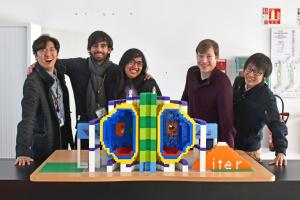Monaco Fellows
A hand in shaping ITER
18 Feb 2019
-
Kirsten Haupt
For the sixth time, ITER is welcoming a group of five young researchers as part of the Monaco-ITER postdoctoral fellowship scheme. Working alongside experienced scientists and engineers at ITER, the Monaco Fellows will be pursuing research assignments in areas of crucial importance to the project.
The sixth group of Monaco Fellows: Jae-Sun Park, Javier Artola, Joyeeta Sinha, Jonathan Coburn and Satoshi Togo (left to right). "At the end of our postdoc we will be able to say that we had a hand in shaping the ITER Project," says Jonathan. "It will be an incredible experience!"
Created in 2008 and renewed in 2018, the Monaco-ITER Partnership Arrangement enables ITER to offer promising young postdocs two-year assignments in ITER scientific or technical divisions. The ITER Project benefits from their fresh ideas and novel approaches while, for their part, the Fellows can test newly acquired expertise and skills at the forefront of their respective fields.
And experience has shown that the ties created by the Monaco Fellows during their stay at ITER last well beyond their two-year fellowships. "Equipped with a deep knowledge of ITER at the end of their appointments, the Fellows become natural ambassadors for ITER," says Tim Luce, head of ITER's Science & Operations Department and coordinator of the Monaco postdoctoral fellowship program.
The interest in this opportunity remains high with the current cohort of Monaco Fellows selected from a pool of more than 90 applicants. Over the next two years, they will be working on the following projects:
Javier Artola (Spain) obtained his PhD in plasma physics and fusion science at the University of Aix-Marseille in France where he researched the physics of large-scale plasma instabilities that typically arise in tokamaks. Using this expertise, Javier will assess the asymmetric forces that could act in the vacuum vessel during plasma vertical displacement events (VDEs).
Jonathan Coburn earned a PhD in nuclear engineering from North Carolina State University in the United States. Based on his experience in researching the impact of high heat fluxes on plasma-facing components, Jonathan will assess the long-term power handling capabilities of the beryllium first wall panels. This assessment will include modelling the erosion, melting, and deformation that may occur during severe plasma disruptions.
Jae-Sun Park received his PhD at the Korea Advanced Institute of Science and Technology (KAIST) working on boundary plasma simulations of KSTAR using ITER code. Building on this experience, he will develop a boundary plasma database for the non-active phase of the first three to four years of the ITER operation. The database will be used for boundary plasma physics research such as divertor detachment physics for sustainable divertor operation, as well as for the coupling to integrated models.
Armed with a PhD from the Swiss Plasma Center (SPC) at École Polytechnique Fédérale de Lausanne (EPFL), Switzerland, Joyeeta Sinha (India) will work on models for the different plasma diagnostics to determine the useful measurement range for plasma initiation during First Plasma. The methods to improve the diagnosis of plasma parameters for the First Plasma operation developed by Joyeeta will then be tested experimentally on other tokamaks such as JET.
Satoshi Togo earned his PhD at the University of Tokyo in 2016 and then worked as a researcher at the Plasma Research Center at the University of Tsukuba, Japan. At ITER, Satoshi focuses on investigating turbulent transport at the plasma edge of tokamaks, which is particularly important for ITER from the viewpoint of core plasma performance and the power flux deposition on plasma-facing components.


